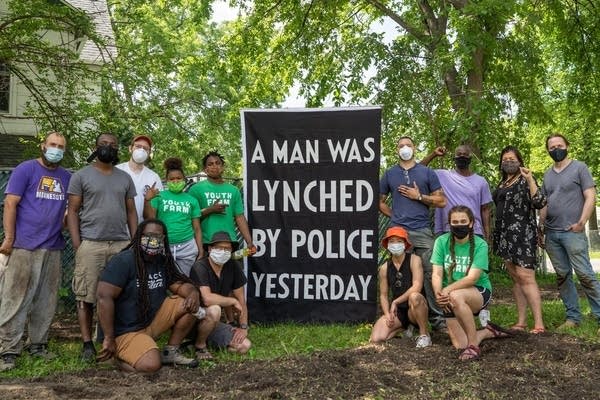Waiting for justice for Floyd, north siders work the land as an act of healing

Go Deeper.
Create an account or log in to save stories.
Like this?
Thanks for liking this story! We have added it to a list of your favorite stories.
It’s one of those warm early summer days in north Minneapolis, and about 20 people are buzzing around a grassy vacant lot off of busy Lyndale Avenue North. The lot won’t be vacant for long as tractors push rocks, dump trucks drop dirt and a stand of trees with roots bundled in burlap waits to be planted. Everyone is hauling, digging and plotting. They are building an urban garden, or food forest.
This urban agriculture project in the Hawthorne neighborhood has been in the works for months. But after the police killed George Floyd, it has become a healing space — particularly for Black residents who often feel targeted and criminalized.
Marcus Kar, who works with a crew of teenagers and young adults, said working in the garden is a form of therapy.
“We’ve been using it as a way to silence the noise and really feel our feelings,” said Kar, who directs programming on the city’s north side for Youth Farm, an urban agriculture organization.
Turn Up Your Support
MPR News helps you turn down the noise and build shared understanding. Turn up your support for this public resource and keep trusted journalism accessible to all.

The garden will incorporate both food and indigenous grasses — a mix of fruit, berries and nut trees. Kar pictures people in this racially diverse neighborhood, where about half of the residents are Black, just plucking healthy food right from the garden as they walk down the street, regardless of whether a corporate grocery store chain has decided to build here.
Ce’Ve’Onna Young, is one of the teens with Youth Farm working here alongside Kar. She is shy and unassuming but reflective and deeply upset about the killing of Floyd, part of a pattern of injustices against the Black community at the hands of police.

“I just want everybody to know that all lives matter, but our lives are in danger right now, especially me growing up Black,” she said. “I don’t want someone just walking up to me and acting racist to me for no reason, because I wouldn’t do that for somebody else.”
Young is working side by side with Yasmine Banishoraka, who is white and lives in south Minneapolis, not far from the city’s 3rd Precinct police station that was torched among protests after Floyd’s killing.
“I have been trying to figure out where I best fit into this and where I can best be an ally to people of color,” said Banishoraka as she shoveled soft brown soil into wheelbarrows. “And this is the best way that I feel like I can do that.”
But she is anxious for real systemic change.
“I know I don’t walk down the street worried about how a police officer is going to approach me,” she said. “I’m tired of stories of the people that I love that constantly have these negative experiences. That shouldn’t happen. So I really want real change — mainly some major change to the police force is an excellent start.”
Jordan Weber, artist-in-residence at the Walker Art Center, designed this garden long before Floyd was killed by police just about 6 miles away. But Weber, who is Black, knows now it’s a gathering place for those feeling shock and horror at the injustice of Floyd’s death as they wait to see what officials will do about racist systems and police brutality.

He says doing this work is an act of healing.
“Today is about putting Black, brown, Indigenous, white hands in the soil together,” he said as he watched the crew taking a break drinking Gatorade under the shade of a canopy. “I can’t speak for the totality of Minneapolis obviously, but I know for the 20 to 30 people involved in this project, it’s been extremely crucial to the process of healing and building anew.”
Before the digging and planting started, Missy Whiteman, who is Northern Arapaho and Kickapoo, and Austin Owen, who is Dakota, blessed this ground.
Weber says it was a powerful message about resistance, solidarity and sovereignty. He remembers Owen acknowledging the fires that consumed a nearby Cub Foods, Walgreens and other businesses in the wake of Floyd’s killing.

As Owen blessed the garden, he told them this is a step toward self-sufficiency “on your own land, with your own people,” Weber recalled.
Whiteman has come back to help build the garden. She said she feels both the heaviness of Floyd’s death and the lightness of creating something new and good.
“A lot of people are like, ‘This is the time of the Phoenix,’” she said “It is like all the feelings and emotions we’re feeling — this is part of the death and rebirth process, and we are all feeling it collectively.”
Marcus Kar said they plan to finish this garden in July and he invites all the community to come and gather here.
Correction (June 22, 2020): Austin Owen was misidentified in a previous version of this story.



